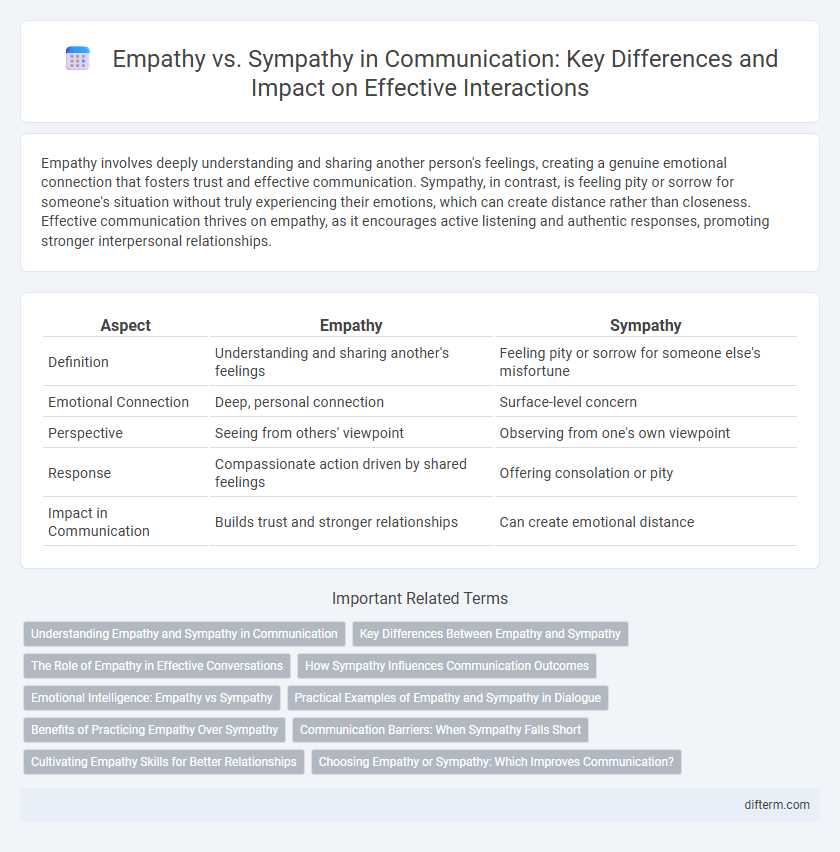Empathy involves deeply understanding and sharing another person's feelings, creating a genuine emotional connection that fosters trust and effective communication. Sympathy, in contrast, is feeling pity or sorrow for someone's situation without truly experiencing their emotions, which can create distance rather than closeness. Effective communication thrives on empathy, as it encourages active listening and authentic responses, promoting stronger interpersonal relationships.
Table of Comparison
| Aspect | Empathy | Sympathy |
|---|---|---|
| Definition | Understanding and sharing another's feelings | Feeling pity or sorrow for someone else's misfortune |
| Emotional Connection | Deep, personal connection | Surface-level concern |
| Perspective | Seeing from others' viewpoint | Observing from one's own viewpoint |
| Response | Compassionate action driven by shared feelings | Offering consolation or pity |
| Impact in Communication | Builds trust and stronger relationships | Can create emotional distance |
Understanding Empathy and Sympathy in Communication
Empathy in communication involves deeply understanding and sharing another person's feelings, creating a connection that fosters trust and openness. Sympathy, by contrast, is recognizing someone's emotional experience without fully immersing in their perspective, often expressing concern or sorrow from a distance. Effective communication harnesses empathy to build rapport and meaningful relationships, while sympathy can provide support without necessarily facilitating emotional alignment.
Key Differences Between Empathy and Sympathy
Empathy involves deeply understanding and sharing another person's emotions, while sympathy refers to feeling compassion or concern without directly sharing their emotional experience. Empathy requires active listening and emotional resonance, which fosters stronger interpersonal connections and trust. Sympathy often maintains emotional distance, offering support from an external perspective rather than immersive understanding.
The Role of Empathy in Effective Conversations
Empathy plays a crucial role in effective conversations by enabling individuals to genuinely understand and share the feelings of others, leading to deeper emotional connections and trust. Unlike sympathy, which often involves feeling pity or concern from a distance, empathy fosters active listening and acknowledges the speaker's perspectives and emotions. This empathetic engagement enhances communication clarity, reduces misunderstandings, and promotes collaborative problem-solving.
How Sympathy Influences Communication Outcomes
Sympathy often evokes a response centered on pity or sorrow rather than understanding, which can create emotional distance in communication. When sympathy dominates, the recipient may feel underestimated or patronized, reducing openness and trust. This distancing effect contrasts with empathy's ability to foster connection and improve dialogue by validating feelings without judgment.
Emotional Intelligence: Empathy vs Sympathy
Emotional intelligence involves understanding and managing emotions, where empathy requires actively perceiving and sharing others' feelings to foster connection and trust. Sympathy, by contrast, entails acknowledging another's suffering without deeply engaging, often creating emotional distance. Mastering empathy within communication enhances interpersonal relationships and conflict resolution by promoting genuine emotional support and understanding.
Practical Examples of Empathy and Sympathy in Dialogue
Empathy in communication involves actively listening to someone's feelings and expressing understanding, such as saying, "I can see how tough this situation is for you." Sympathy, by contrast, often takes the form of pity or concern, like responding with, "I'm sorry you're going through this." Practical examples highlight empathy through validating emotions and shared experience, while sympathy generally centers on offering comfort without deep emotional connection.
Benefits of Practicing Empathy Over Sympathy
Practicing empathy enhances communication by fostering deeper emotional connections and promoting mutual understanding between individuals. Empathy allows for active listening and validation of feelings, which reduces conflict and builds trust more effectively than sympathy. This emotional engagement supports collaborative problem-solving and strengthens interpersonal relationships in both personal and professional settings.
Communication Barriers: When Sympathy Falls Short
Empathy enhances communication by fostering genuine understanding, while sympathy often creates a disconnect due to its superficial nature. Sympathy can act as a communication barrier because it centers on pity rather than shared feelings, leading to misunderstandings and emotional distance. Effective communication requires empathy to bridge emotional gaps and build trust, enabling deeper connections.
Cultivating Empathy Skills for Better Relationships
Cultivating empathy skills involves actively listening and understanding others' emotions to foster deeper connections and improve communication effectiveness. Empathy encourages perspective-taking that builds trust and reduces conflicts, unlike sympathy which often creates emotional distance by expressing pity. Enhancing empathy in relationships promotes mutual respect and emotional support, leading to stronger and more meaningful interpersonal bonds.
Choosing Empathy or Sympathy: Which Improves Communication?
Choosing empathy over sympathy significantly improves communication by fostering deeper understanding and connection between individuals. Empathy allows one to genuinely share and acknowledge another's feelings, promoting trust and openness, while sympathy may create distance by expressing pity rather than shared experience. Effective communicators prioritize empathy to enhance relational dynamics and facilitate meaningful dialogue.
empathy vs sympathy Infographic

 difterm.com
difterm.com